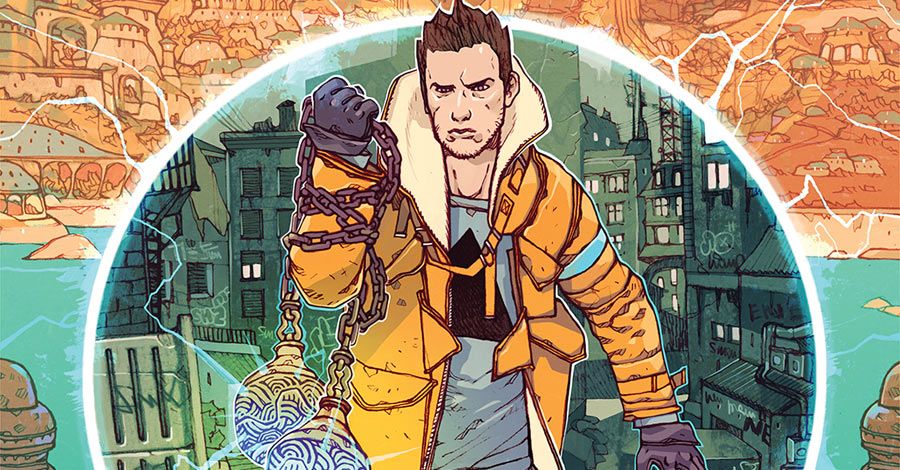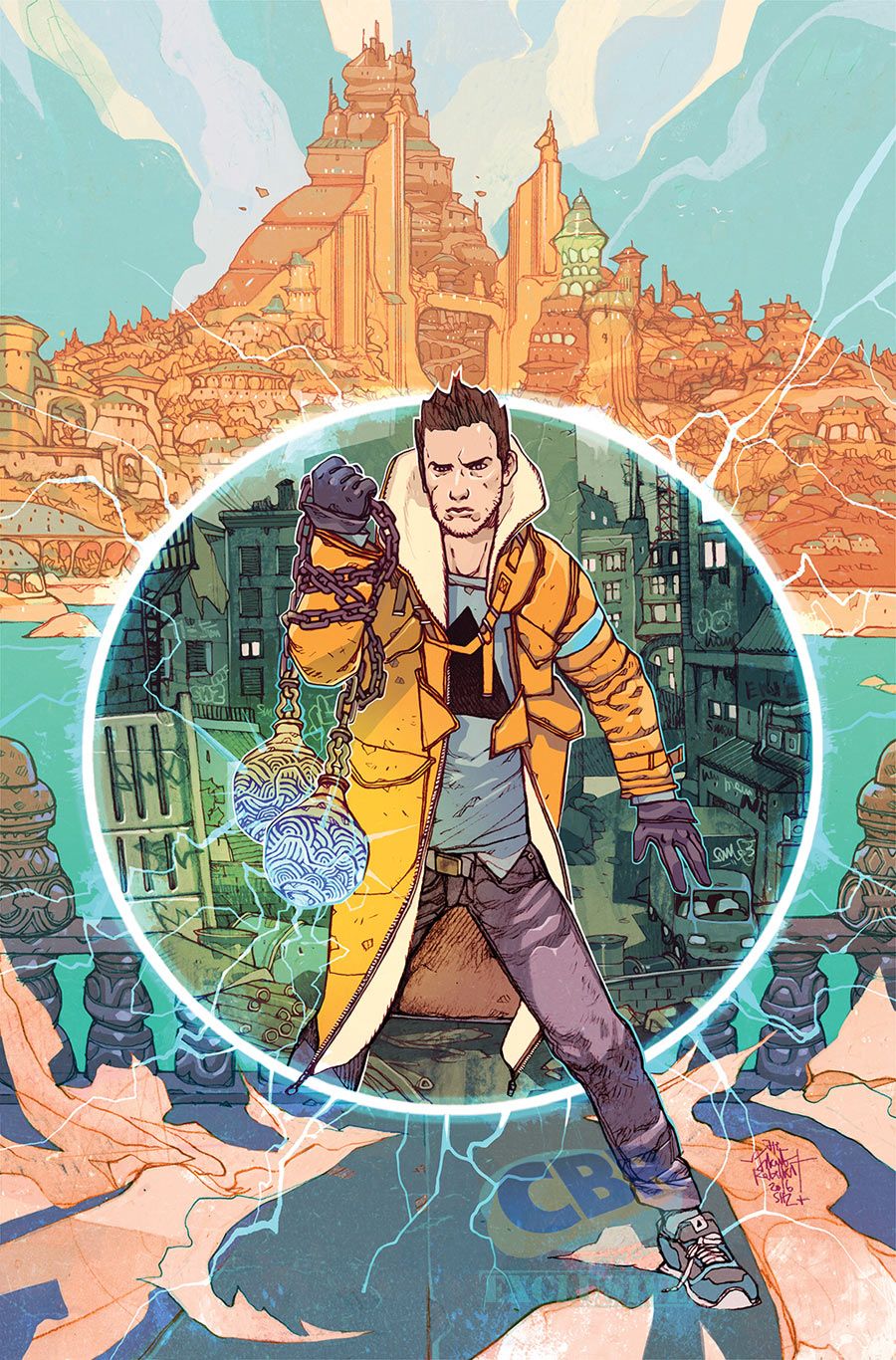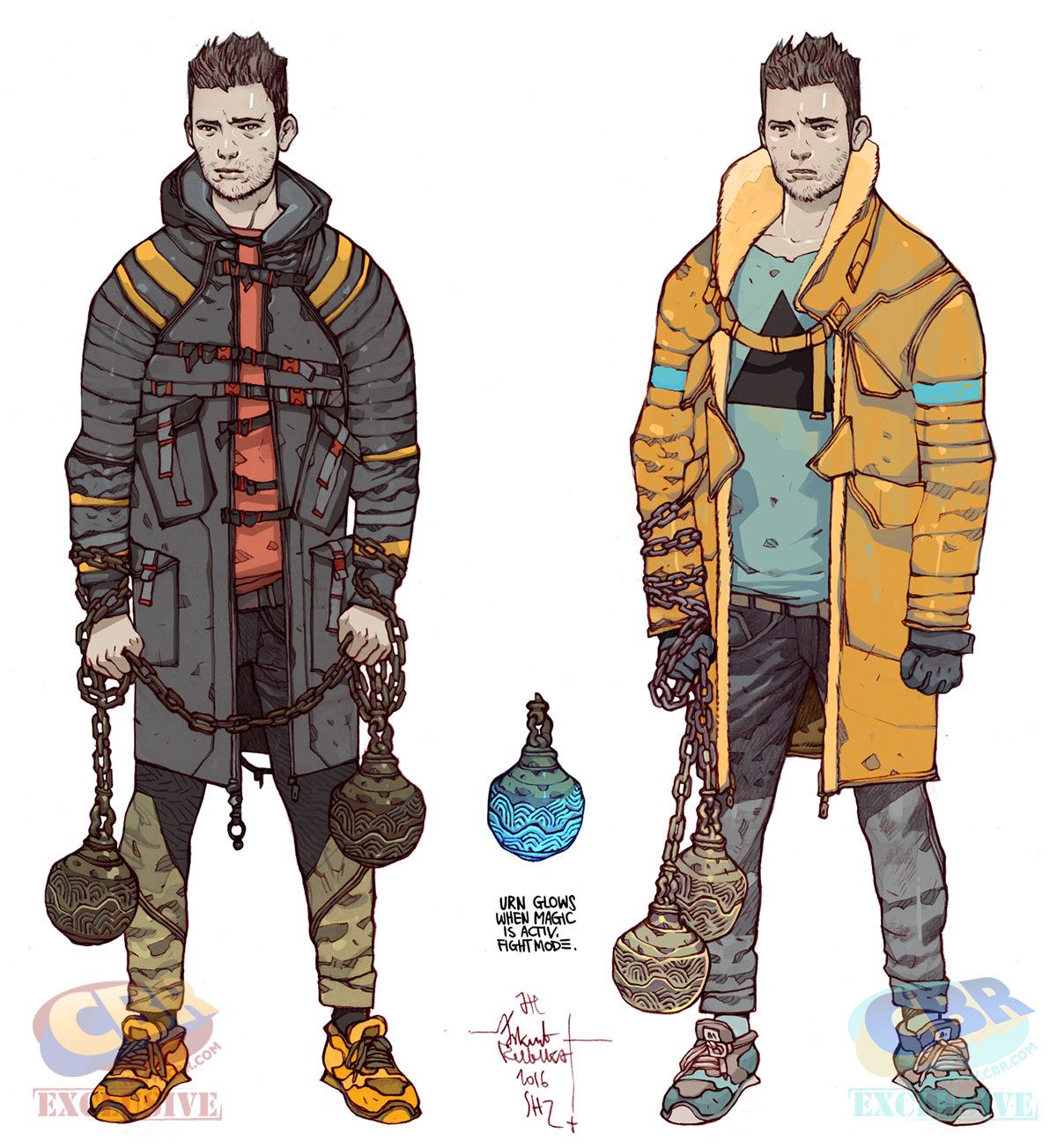The relationship between parents and children remains as complicated in life as it does in fiction. That's exactly what "Namesake," the new BOOM! Studios comic book series launching this November from writer Steve Orlando and artist Jakub Rebelka, will focus on -- but with a series of twists.
RELATED: INTERVIEW: Steve Orlando on Fighting Back, Speaking Up & Coming Out in "Virgil"
The four-issue fantasy series stars Jordan, a young man with an unusual mission: he needs to bring the corpses of his dads to a world called Ektae to fulfill a deep familial obligation. With two dads -- one from Earth, the other from Ektae -- Jordan utilizes the one time every seven years when the two worlds interconnect to carry their urns to a final resting place.
Orlando spoke exclusively with CBR News about building this world along with Rebelka, the importance of creator-owned work and why "Namesake" marks his one entry in that arena in 2016.
CBR News: You have a number of books in the works at the moment encompassing both shared universe and licensed books, and in March DC Comics announced that you were signed to an exclusive contract. What made "Namesake" the right creator-owned book for you at this point in your career, and what made BOOM! the right home for it?
Steve Orlando: It's a combination of a couple different things. With some of the best ideas you spend months or years trying to figure out something. I've been wanting to do a book at BOOM! for a while and tried to find the right project. You can -- like with any fiction or creative process -- you can stare at a wall figuratively for a long time and not even know if you're pacing, but then, in the case of something like "Namesake," I was just struck by this image. I had no doubts of it and you see it on the cover: this spaghetti western-style character, but instead of dragging a coffin, drags these two enormous urns behind him everywhere he went.
I couldn't let go of it. It was in the middle of the night because that's when things happen to me when my downstairs neighbor's kid is crying, when most comics get written. With the time difference, I wake up Eric [Harburn] at BOOM! way too early like, "Oh, this is the thing!" We both liked this incredible image and everything grew around that.
When that happened, it just felt right. Everything in comics, when it happens, it feels really fun and perfect and that's what happened with "Namesake." It was the image we wanted and the story was built around that, the history of why these things exist all grew around that. A book can really come from anywhere and in the case of "Namesake" and the case of what we wanted to get from this book, I knew they'd be very supportive with the types of leads I wanted to do, with the types of things I wanted to dig into.
If you've read "Midnighter" or "Virgil" you know I like to work with leads who are sort of outside the mainstream. Jordan is no different with his background and his point of view. It's just a great opportunity to create a new world and dig into the themes that appeal to me like non-traditional leads and this idea of society and fantasy and all the types of comics weirdness that hopefully I'm becoming known for.
Can you tell us a little bit about the world of Ektae and what it represents for you as a writer?
If "Virgil" is my weird personal exploitation book and "Midnighter" is my weird superhero, "Namesake" is me doing "Final Fantasy." Ektae, the world in "Namesake," is this world infused with magic, but what I liked about "Final Fantasy" was not just the incredible architecture. I was a kid who grew up playing "Final Fantasy III" and "Final Fantasy VII." What struck was the world-building. It was this massive, cathedral-style architecture and with all the things they had, there were still rules. That's what we wanted with "Namesake." We have this magic, fantastic world, but build around these core concepts. This one thing makes Ektae different, but it's the law of physics that makes it a totally different, wild world. I just go there and explore all the things that I care about -- family, sexuality, obligation -- in a way that is new, beautiful, exciting. It's a book by me, so you know a lot of people are going to get punched in the face and it's going to be happening in new and different ways, but as with all the things I do, there's always a human core behind that.
"Namesake" to me is not just a title. It's about family. People always say, "You can't choose your family" or "It's family, you wouldn't understand," because you would do things for family that don't make sense. How can that be writ large in a fantastic, fantasy setting with the type of breaking-jaws that I think are my brand.
Earlier you mentioned Jordan is a non-traditional hero. What sets him apart in that regard?
I try to do books that feature non-normative characters that aren't about that, for whom that is but one part of their personality, but doesn't fetishize those things because I've never wanted to do that. In the books that I do, if you're queer, if you're trans or any kind of minority, any kind of thing that's outside the norm, the book treats that just as normal as we want to be treated in the real world. I never want to do a book that turns the spotlight on someone and says, "Oh, look how accepting we are of this!" Really, that's all about the creators or the mainstream wanting their cookie for being okay with someone, which you don't get. These things are not problems, they're not prime drivers in the book. They're accepted because that's what they should be.
We've seen things about avenging families, but I haven't seen a book where it's family and avenging with your parents when you have two fathers. So, Jordan has two fathers. One from Ektae and one from Earth. That is a huge part of his character, but, like I said, it's not the conflict driver of the book. It's not an issue for him. That's the background for him and you'll see that explored throughout the book.
I wanted to do that story, again, just like something with "Virgil," where at its heart it's something everyone can connect to. Fighting to protect your loved ones is the point of connection. You blow that up and it's about a gay couple, but you can understand it. You can relate to them because this thing that they need in this story is so universal, that maybe we're not that different in ways that matter. That's what we hope to do in all of my work. Avenging your parents and finishing up their unfinished business is a very universal story. The majority of every human will have to deal with that. We see that in a fantasy setting with Jordan. That's the sort of work we hope to do without being patronizing or pedantic.
Jordan clearly has a huge ordeal in front of him. What are some of the emotional challenges he faces as he's trying to fulfill this obligation?
Jordan's greatest enemy as the book starts out is himself. He's got a lot of anger. Like everybody has their flashpoint, he has things he just doesn't want to talk about that drive him. Jordan is an angry person trying to find a way to be placid. It's a challenge for him. His instinct is not to play by the rules of either society, but he needs to, he wants to, to show that he's more.
The first struggle is that: He has problems stemming from things he doesn't know. He says in Issue #1 that finding out about his parents is not about who he is now, it's about the fact that the first chapter has always been a blank page. It's about showing him that page. The not knowing where that anger comes from, a lot of us deal with that. If you find out, maybe you can do something or find a trait that your grandfather or father had, but you never knew where that came from. He needs to know that.
There must also be a fair number of personal or physical roadblocks in his way too.
Beyond the emotional challenge is the fact that his parents got him into trouble in the past. He has to go to Ektae to bury his parents. That's all well and good except for the fact that one of the biggest power brokers on Ektae is someone he punched in the face 10 years ago over these same feelings of inadequacy. The problem is that he's much more powerful, so the minute Jordan gets to Ektae, it's not just about his present struggles, his past catches up with him. No matter how powerful this guy is, he can't get over the fact that Jordan embarrassed him. It's not just because of who he is now, but who he was. It's all connected.
The very question is, how do we know he's telling the truth? The urns that he carries on his back are outlawed on Ektae because iron disrupts. It's a different law of physics on Ektae that we call magic. On one hand, his parents said, "Come bury me," but on the other they give him a bunch of contraband that's going to get him arrested. We hit a lot of things and topple a lot of buildings along the way.
This is all about parents and what they see has helping us, but often seems harmful. Everything is a mixed blessing. It's all about intention versus reality and accepting those things as a whole. Real people aren't just good or just bad. You have to learn to accept them for all those things. In Jordan's case, it involves "Mad Max"-style chases through booby-trapped towns and all these things that make it exciting. As with the best fiction, we're really talking about the heart, the things that we go through.
How did you go about developing the world of "Namesake" and Ektae with Jakub? Did you have it all worked out on the page or was it a more collaborative effort?
I try to give inspiration and reference for visuals, but the design, the look of the world and the body language of the characters I intentionally leave vague because that's where being a true co-creator comes in. I put those sorts of ideas to Eric and Jakub and let him further inspire me. I see where he takes the words I put down and how he interprets them. I find that very interesting and I think that makes it fresher. Everyone has a true physical part in the creative process and it's not just me over here writing, Jakub over there illustrating and Eric editing.
Way back in the day when I first started writing comics in the back of a Denny's, I did a book called "Normal;adj." It was a one-page script that I wrote with completely gender neutral nouns and adjectives with really no description. I sent it to 20 or 22 different artists and they each illustrated the page. The interesting thing was to see what they interpreted as the normal world, what the interpreted as attractive. All these things are completely subjective.
You have to trust your collaborator to take that seed. The feel and the physics of it, I put out, but the actual visual, I don't like to do too much. Then you're getting in the way of that raw creativity. That's how I approach doing the visuals for anything.
Do you find it's important to keep returning to this creator-owned space even with all the other work you have going on?
I think it's incredibly important because it's two different muscles. You have to keep them both moving. I find one compliments the other. Creator-owned work allows you to create from whole cloth. You're building the foundation. That's exciting and it's extremely collaborative and extremely fresh. Work for hire can also be extremely fresh and often is, but I look at it differently. There, the foundation in many cases was built 75 years ago. You are then picking out these bricks and these tiles in an art deco skyscraper. You're polishing these things, building these things and adding to the super-structure. They're totally different things and they're both extremely exciting. I would never see a reason not to both.
Steve Orlando and Jakub Rebelka build a whole new world at BOOM! Studios with "Namesake" #1 in November.



